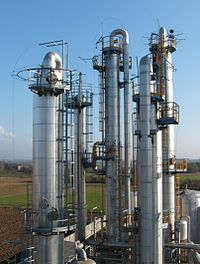Chemical engineer: Difference between revisions
NawlinWiki (talk | contribs) m Reverted edits by 64.251.48.132 (talk) to last version by Unpopular Opinion |
|||
| Line 3: | Line 3: | ||
==History== |
==History== |
||
The term appeared in print in 1839, though from the context it suggests a person with [[mechanical engineering]] knowledge working in the [[chemical industry]].<ref>Ure,Andrew (1839) ''A Dictionary of Arts Manufactures and Mines'', London: Longman, Orme, Brown, Green & Longman, page 1220</ref> |
|||
In 1880, [[George E. Davis]] wrote in a letter to Chemical News 'A Chemical Engineer is a person who possesses chemical and mechanical knowledge, and who applies that knowledge to the utilisation, on a manufacturing scale, of chemical action.' He proposed the name Society of Chemical Engineers, for what was in fact constituted as the [[Society of Chemical Industry]]. At the first General Meeting of the Society in 1882, some 15 of the 300 members described themselves as chemical engineers, but the Society's formation of a Chemical Engineering Group in 1918 attracted 400 members. <ref>Colin Duvall and Sean F, Johnston (2000) ''Scaling Up: The Institution of Chemical Engineers and the Rise of a New Profession'' Kluwer Academic Publishers</ref> |
|||
In 1924 the [[Institution of Chemical Engineers]] adopted the following definition 'A chemical engineer is a professional man experienced in the design, construction and operation of plant and works in which matter undergoes a change of state and composition.'<ref>''Transactions of the Institution of Chemical Engineers'' volume 2 page 23 (1924)</ref> (The first female member joined in 1942.)<ref>Colin Duvall and Sean F, Johnston (2000)''Scaling Up: The Institution of Chemical Engineers and the Rise of a New Profession'' Kluwer Academic Publishers</ref> |
|||
As can be seen from the later definition, the occupation is not limited to the [[chemical industry]], but more generally the process industries, or other situations in which complex physical and/or chemical processes are to be managed. |
|||
In 1951 the President of the Institution of Chemical Engineers said in his Presidential Address "I believe most of us would be willing to regard [[Edward Charles Howard]] (1774-1816) as the first chemical engineer of any eminence"<ref>''Transactions of the IChemE'' (1951) Volume 29 page 163</ref>. Others have suggested [[Johann Rudolf Glauber]] (1604-1670) for his development of processes for the manufacture of the major industrial acids.<ref>Herman Skolnik ''in'' W. F. Furter (ed) (1982) ''A Century of Chemical Engineering'' ISBN 0-306-40895-3 page 230</ref> |
|||
== Overview == |
== Overview == |
||
Revision as of 13:39, 18 November 2008

In the field of engineering, a chemical engineer is the profession in which one works principally in the chemical industry to convert basic raw materials into a variety of products, and deals with the design and operation of plants and equipment to perform such work.[1] In general, a chemical engineer is one who applies and uses principles of chemical engineering in any of various practical applications; primarily with respect to the study of the design, manufacture, and operation of plant and machinery in industrial chemical and related processes. A number of famous or historical chemical engineers can be found in the list of chemical engineers.
History
Overview
Historically, the chemical engineer has been primarily concerned with process engineering. The modern discipline of chemical engineering, however, encompasses much more than just process engineering. Chemical engineers are now engaged in the development and production of a diverse range of products, as well as in commodity and specialty chemicals. These products include high performance materials needed for aerospace, automotive, biomedical, electronic, environmental and military applications. Examples include ultra-strong fibers, fabrics, adhesives and composites for vehicles, bio-compatible materials for implants and prosthetics, gels for medical applications, pharmaceuticals, and films with special dielectric, optical or spectroscopic properties for opto-electronic devices. Additionally, chemical engineering is often intertwined with biology and biomedical engineering. Many chemical engineers work on biological projects such as understanding biopolymers (proteins) and mapping the human genome.
Employment and Salaries
In the United States of America, the Department of Labor estimated in 2006 the number of chemical engineers to be 30,000. The average hourly wage for a chemical engineer was $39.23 per hour, but ranged from $24.07 to $57.05 per hour. The median annual salary for a chemical engineer was $78,860, with the middle 80 percent of chemical engineers making between $50,060 and $118,670 annually.[2] Chemical engineering has been cited as the highest-paying degree for first employment of college graduates.[3] Subsequently, a high-end salary grade is common to this profession in the USA.
In the UK, the Institution of Chemical Engineers 2006 Salary Survey reported an average over £53,000, with a starting salary for a graduate averaging £24,000[4].
See also
- American Institute of Chemical Engineers (AIChE)
- Distillation
- Fluid dynamics
- Heat transfer
- History of chemical engineering
- Institution of Chemical Engineers (IChemE)
- List of chemical engineering societies
- List of chemical engineers
- Mass transfer
- Process control
- Process design (chemical engineering)
- Process engineering
- Unit operations
- WikiProject: Chemical and Bio Engineering
References
- ^ Licker, Mark, D. (2003). Dictionary of Engineering", McGraw-Hill, 2nd Ed.
- ^ U.S. Department of Labor, Bureau of Labor Statistics: Chemical Engineers
- ^ Chemical Engineering Ranked Highest Paying Degree, Department of Chemical Engineering, Princeton University, February 15, 2006
- ^ Institution of Chemical Engineers Annual Review 2006
